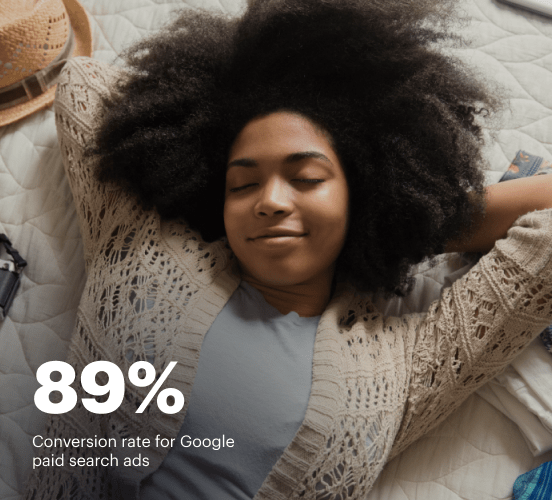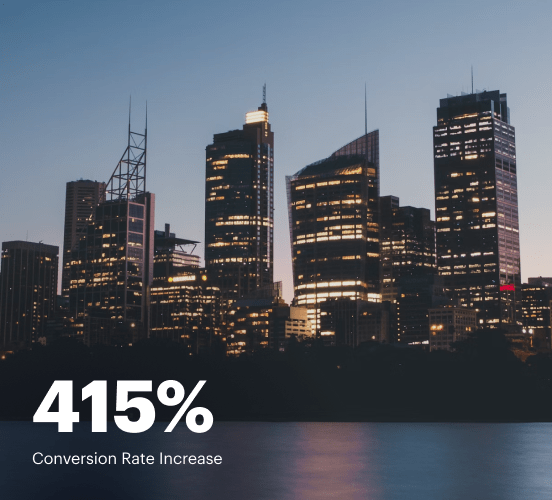How Canva vs. Leadpages vs. Instapage stack up against each other
Compare Instapage with Canva and Leadpages to create high-converting landing pages. With personalization, optimization, and collaboration tools, Instapage helps you deliver experiences that drive results.
Get startedSee how Instapage stacks up against the competition
| Feature | Instapage | Other builders |
| Drag-and-Drop Tools | ||
| Conversion-optimized templates | ||
| Manual and AI-powered A/B Tests | ||
| AI content suggestions | ||
| Popups and sticky bars | ||
| Canvas and grid blocks | ||
| Reusable and global elements | ||
| Form and popup builders | ||
| Built-in Heatmaps | ||
| Central analytics dashboard | ||
| Ad-to-page personalization and collections | ||
| Contacts, lists, and email | ||
| Dedicated, full-service CRO experts | ||
| Enterprise-ready platform |
Leading the way in building high-performing landing pages





Why Instapage is the smarter choice for your campaigns
Get everything you need to build, scale, and optimize high-converting landing pages—without coding.
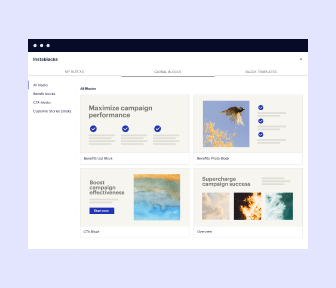
Easier page building without coding
Instapage offers a flexible and seamless page creation experience with a library of 500+ conversion-focused layouts, Instablocks®, a drag-and-drop builder, and AI content generation. With technologies like Thor Render Engine®, you can create on-brand, mobile-responsive landing pages that load quickly and start converting during initial visitor clicks.
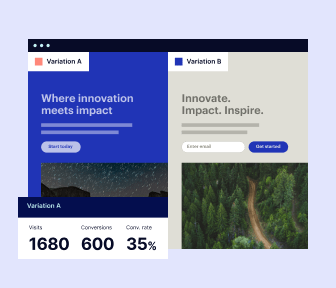
More insights — better results
Instapage lets you see in detail how each landing page experience and variation is performing so you can make targeted changes that boost page conversions. Use heatmaps for a better understanding of on-page activities, run A/B tests and AI-assisted experiments, and then track and evaluate results within robust analytics dashboards.
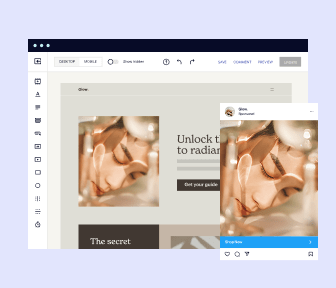
More personalized experiences
Instapage lets you quickly create high-performing landing pages tailored to each of your ad campaigns. Deliver personalized experiences for distinct audiences using dynamic text replacement. Effortlessly align specific advertisements to unique pages with AdMaps. Monitor audience-level metrics using our advanced data tools.
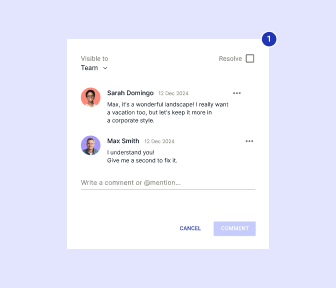
Built-in collaboration
Instapage collaboration capabilities bring your entire team together to speed up the process of landing page review, approval, and launch. No more frustrating and unnecessary revisions or edits scattered across emails. Provide instant feedback, conduct real-time page edits, and securely share your pages with outside stakeholders.
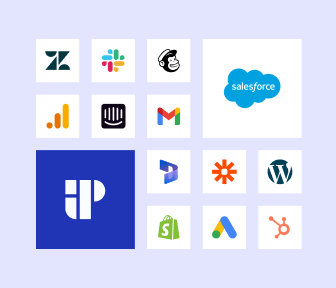
Free up time for your business
Invest time into business growth, not busy work. Launch landing pages faster with reusable forms and templates. Build once, reuse forever.
Explore all integrations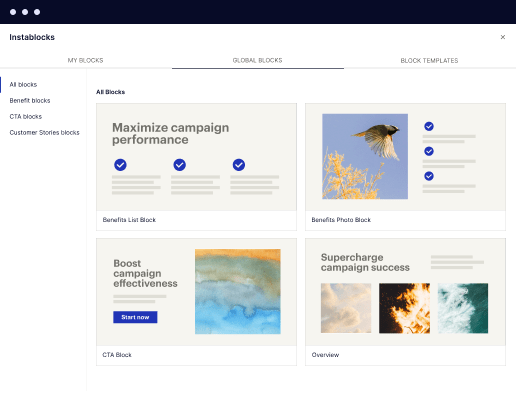
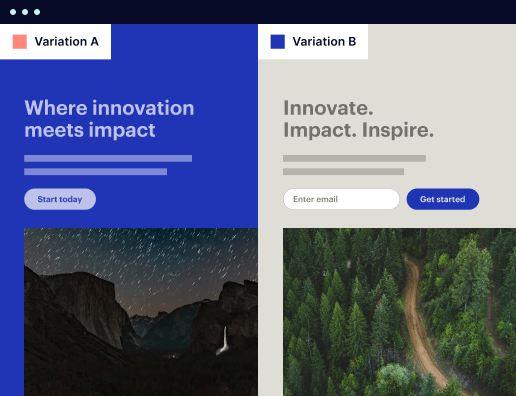
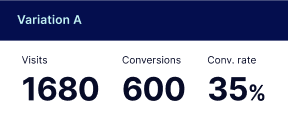
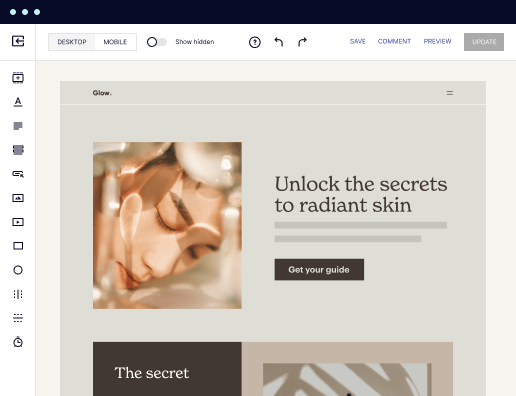

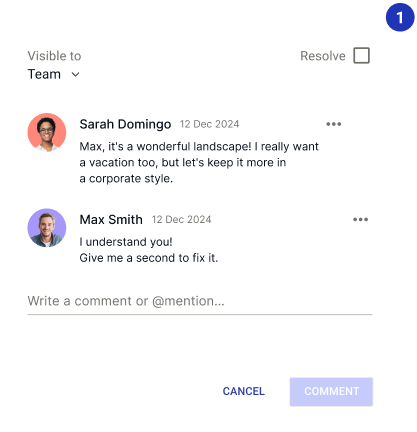
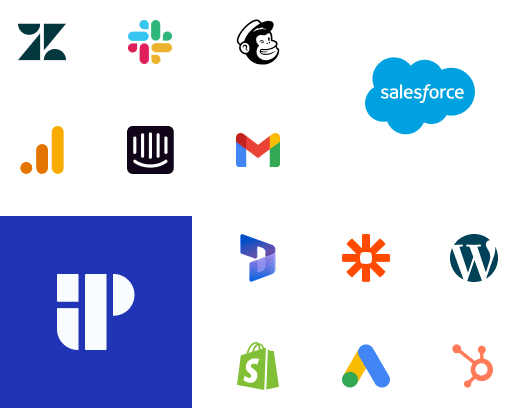
Easier page building without coding
Instapage offers a flexible and seamless page creation experience with a library of 500+ conversion-focused layouts, Instablocks®, a drag-and-drop builder, and AI content generation. With technologies like Thor Render Engine®, you can create on-brand, mobile-responsive landing pages that load quickly and start converting during initial visitor clicks.
More insights — better results
Instapage lets you see in detail how each landing page experience and variation is performing so you can make targeted changes that boost page conversions. Use heatmaps for a better understanding of on-page activities, run A/B tests and AI-assisted experiments, and then track and evaluate results within robust analytics dashboards.
More personalized experiences
Instapage lets you quickly create high-performing landing pages tailored to each of your ad campaigns. Deliver personalized experiences for distinct audiences using dynamic text replacement. Effortlessly align specific advertisements to unique pages with AdMaps. Monitor audience-level metrics using our advanced data tools.
Built-in collaboration
Instapage collaboration capabilities bring your entire team together to speed up the process of landing page review, approval, and launch. No more frustrating and unnecessary revisions or edits scattered across emails. Provide instant feedback, conduct real-time page edits, and securely share your pages with outside stakeholders.
Free up time for your business
Invest time into business growth, not busy work. Launch landing pages faster with reusable forms and templates. Build once, reuse forever.
Explore all integrationsGet started with Instapage in a few steps
-
Create your Instapage account
Start with Instapage by signing up via Google or your email. You'll get access to a free 14-day trial to discover Instapage capabilities. Feel free to cancel anytime during the 14-day trial if you decide that our product is not suitable for your business. -
Build and personalize your page
Create your first landing page from scratch or choose a template from 500+ customizable layouts. Use the drag-and-drop builder to add page elements, fonts, and backgrounds, refine content with AI, or add custom HTML, Javascript, and CSS. -
Review and make edits
Collaborate on page designs and streamline review processes. Invite your team members and stakeholders to review, edit, and provide feedback on your landing page. Collaborate knowing your page is confidential and only accessible to authorized users. -
Publish and track page performance
Publish your page to a domain or custom URL. Connect your pages to the ads you've created and track page performance within the analytics dashboard, run A/B tests and AI experiments, analyze results, and continuously optimize your landing page to maintain high conversions.
Instapage vs. Canva vs. Leadpages – Who Comes Out on Top?
Choosing a landing page builder is akin to assembling a dream team for your marketing campaigns. Every platform brings unique superpowers to the table, vying for your attention and investment. In this showdown, we pit three of the biggest players against each other to see which can best support your mission of growth and conversion. With the stakes high, we'll dive into the features, benefits, and drawbacks of Instapage, Canva, and Leadpages, helping you uncover the winning solution for your business. Let’s explore how each contender stands out and where they might fall short, all while keeping the focus on enhancing conversion rates and building trust with your audience. As we dissect these platforms, remember that Instapage is designed to empower marketers to reduce costs, grow conversions, and deliver relevant landing page experiences that increase brand trust and customer loyalty. Buckle up for an insightful ride through the competitive landscape of landing page creators. (220 words)
Meet the Competitors in the Digital Arena
In one corner, we have Instapage, celebrated for its extensive customization options and powerful conversion tools. It caters to marketers looking for a robust solution that seamlessly integrates with existing workflows. In the opposite corner, we find Canva, renowned as a versatile design tool that has stepped into the landing page arena. It's perfect for those who value aesthetics and ease of use, providing attractive templates to engage visitors. Lastly, we have Leadpages, known for its strong track record in lead generation, offering users a range of templates and marketing functionalities to boost conversions. Each contender brings a unique flair to landing page building, making them worthy participants in this contest. As we dissect their offerings, we’ll uncover what they bring to the table and which one might just claim the title of your new go-to landing page builder. (210 words)
Feature Showdown – A Deep Dive into Capabilities
Template Variety and User-Friendliness: A Comparative Look
When it comes to template variety and user-friendliness, each platform has its strengths. Instapage offers a vast library of customizable templates optimized for conversion, which users can tweak to suit their branding. The interface is intuitive, allowing users to build and launch high-converting pages quickly. Canva, on the other hand, shines with its stunning visual designs. It provides a more artistic approach, enabling users to create visually appealing landing pages with drag-and-drop simplicity. However, some users may find its conversion-focused features lacking compared to Instapage. Leadpages bridges this gap well. Its templates are geared toward maximizing leads, and the user experience is streamlined for quick deployment of marketing campaigns. Overall, while each platform excels in its niche, Instapage stands out for marketers who prioritize conversions over aesthetics. (210 words)
Instapage: Your Partner in Customization and Optimization
Instapage is not just another landing page builder; it’s a dedicated tool designed specifically for marketers focusing on customization and conversion optimization. With an impressive library of over 500 templates and an intuitive drag-and-drop editor, it allows users to create unique landing pages that align with their brand image. The platform's A/B testing and heatmap features provide actionable insights, helping marketers understand what elements resonate with their audience. Furthermore, Instapage’s seamless integration with various marketing and analytics tools ensures a comprehensive approach to monitoring performance and adjusting strategies. Users can expect to experience reduced costs and enhanced conversions with Instapage, elevating their online marketing efforts. By focusing on delivering relevant landing page experiences, Instapage builds brand trust and customer loyalty, positioning itself as a formidable contender in the market. (210 words)
Round Two: Speed and Performance on Display
Picture this: you’re eagerly waiting at your favorite coffee shop, and the line just won’t budge. Frustrating, right? This scenario serves as a reminder of how crucial loading speed is for landing pages. In this round, we’ll assess the speed and performance of all three platforms, understanding how fast loading times can significantly impact user experience and conversion rates. A speedier page can be the difference between a visitor bouncing away and a potential customer completing a purchase. (100 words)
Why Instapage Stands Out in Speed and Performance
- Instapage boasts fast page load times often under 1 second, minimizing visitor drop-off.
- Optimized for mobile responsiveness, ensuring quick access on various devices.
- Utilizes advanced caching mechanisms to enhance load speeds.
- Integrates with CDN (Content Delivery Network) services for maximum performance.
Speed and Performance Highlights for Canva
- Canva’s pages load at moderate speeds but may vary based on design complexity.
- Ideal for simple, visually appealing designs that do not lag.
- User interface is responsive, providing quick access while designing.
Leadpages Speed and Performance Advantages
- Leadpages features fast loading templates tailored for lead generation.
- Provides built-in speed optimization settings for better performance.
- Responsive design ensures seamless viewing across all devices.
- Utilizes a reliable infrastructure to minimize downtime and boosts user experience.
In conclusion, while all three platforms offer decent speed, Instapage clearly excels in this department. Its commitment to fast loading times solidifies its position as a frontrunner in fostering higher conversion rates and enhancing user experiences. (100 words)
Learning Curve: Ease of Use and Accessibility
Navigating a new platform can feel intimidating, but we’ll reassure you that all three contenders welcome newcomers with open arms! Instapage has simplified its dashboard, making it user-friendly for beginners while catering to advanced users as well. It offers tutorials and resources to guide you along the way. Canva, meanwhile, is incredibly approachable for users familiar with graphic design, utilizing a visual, drag-and-drop interface that simplifies page creation. Although it may require some time to familiarize yourself with its marketing capabilities, its aesthetic focus is definitely appealing. Leadpages offers a straightforward experience too, with easy-to-navigate templates that empower users to create effective landing pages quickly. While each platform has a gentle learning curve, your choice will ultimately depend on your familiarity with design versus marketing goals. (210 words)
Customer Support: Your Safety Net
Customer support is like the trusty sidekick you want by your side during your journey with any platform. Instapage’s support team is accessible through chat and email, providing quick assistance when you need it most. Their robust knowledge base and active community forums enhance the user experience, meaning answers are often just a click away. Canva shines in its visual resources, offering tutorials and a vibrant community for design-related queries. However, they may lack direct customer support for technical issues. Leadpages also provides chat and email support, along with a wealth of documentation that helps users navigate their features efficiently. Overall, Instapage leads in terms of comprehensive customer support, offering users peace of mind as they build their landing pages. (210 words)
The Final Verdict: Pricing for Value
When it comes to pricing, each platform has its own structure that may cater to different budgets and business needs. Instapage is priced higher than its competitors, but the investment is backed by robust features focused on maximizing conversions. Canva offers affordable packages ideal for those seeking to create visually stunning designs without a hefty commitment. Leadpages sits in the middle, striking a balance between features and cost. Understanding the nuances of each pricing model will assist you in determining which platform aligns with your goals while delivering the most value. (210 words)
In wrapping up this comparison, it's evident that while all three platforms boast unique strengths, your specific needs will dictate the ultimate choice. Whether you prioritize customization with Instapage, aesthetic appeal with Canva, or lead generation with Leadpages, the right platform is one that aligns with your marketing strategy. We encourage readers to take Instapage for a spin with a free trial or demo, experiencing firsthand how it can empower your marketing efforts and help you achieve your conversion goals. (210 words)

